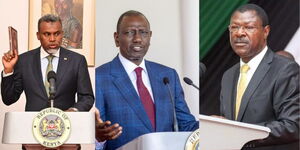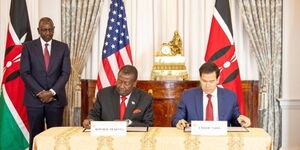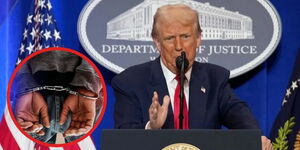At least 30,000 Kenyans living in the United States have been put on high alert after President-elect Donald Trump on Monday, November 18, confirmed he would declare a national emergency to carry out his campaign promise of mass deportations of irregular migrants living in the US.
Trump, who is among the most active world leaders on social media, reposted a post from November 8 by his ally Tom Fitton, the head of the conservative Judicial Watch organization.
In his post, Fitton suggested that the new administration was “prepared to declare a national emergency and will use military assets to reverse the Biden invasion through a mass deportation program.”
To achieve his goal of mitigating irregular immigrants, Trump has lined up several immigration hardliners to serve in key Cabinet positions, including South Dakota Governor Kristi Noem. Noem was picked to be Homeland Security secretary, pending Senate confirmation.
In the run-up to the US elections, Trump took a strong focus on immigration as one of his main campaign issues, especially over the rising number of immigrants.
During his campaigns, he vowed to close the border and stop the flow of irregular immigration, which according to him rose to unprecedented levels during the Biden-Harris administration.
Why it matters: Currently, there are 11 million unauthorized migrants living in the U.S. without legal immigration status, including Kenyans.
At least 30,000 Kenyans are reported to be living in the US without proper legal documentation, according to data from the 2020 US Census Bureau. The number could be higher in 2024.
Also, the US has the highest number of Kenyan migrants (157,000), followed by the United Kingdom (139,000), according to the dataset of International Migrant Stock 2020 by the United Nations Department of Economic and Social Affairs.
That figure puts Kenya fifth among African countries of origin for immigrants in the US. Nigeria is the top source of Africans in the States.
With Trump's new resolve, undocumented Kenyans in the US now face a genuine threat of being expatriated back to Kenya, despite some of them establishing a decent life in the States.
Besides potential deportation issues, another key area of concern for Kenyans after Trump's election is the potential restriction of Optional Practical Training (OPT), which allows international students to gain practical work experience in their field for up to three years after graduation.
During his previous term, Trump's administration considered restricting OPT, particularly the 24-month extension granted to students in STEM fields.












